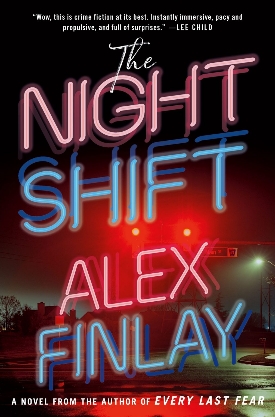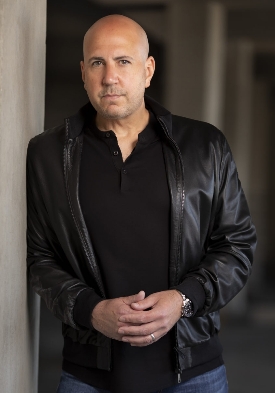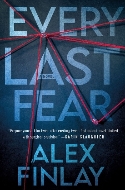 Synopsis:
Synopsis:
The night was expected to bring tragedy.
New Year’s Eve 1999. Y2K has long been expected to bring chaos: planes falling from the sky, elevators plunging to earth, world markets collapsing. A digital apocalypse. None of that happens.
But at a Blockbuster Video store in Linden, New Jersey, four teenage girls working the night shift are attacked. Only one survives. Police quickly identify a suspect. But he flees and is never apprehended.
Fifteen years later, four teenage employees working late at an ice cream store in the same town are attacked. Again, only one makes it out alive.
Both surviving victims recall the killer speaking only a few final words: “Goodnight, pretty girl.”
In the aftermath, three lives intersect: the survivor of the Blockbuster massacre who’s forced to relive her tragedy; the brother of the accused fugitive, who is convinced the police have the wrong suspect; and the FBI agent who must delve into the secrets of both nights, stirring up memories of teen love and lies, in order to uncover the truth about murders on the night shift.
The Night Shift is a story about the legacy of trauma and how the broken can emerge on the other side of it.
Review:

Alex Finlay is the pseudonym adopted by Washington, D.C. appellate attorney Anthony Franze, who has penned two legal thrillers, The Advocate’s Daughter and The Outsider. His commercial fiction debut, Every Last Fear is an absorbing, heartbreaking thriller, at the center of which is a young film student who has to come to terms with the death of his parents and two siblings. Finlay describes it as a tale that is, at its heart, a story about a family torn apart and brought back together by tragedy.Alex Finlay is the pseudonym adopted by a lawyer who has penned law-related books. His debut novel, Every Last Fear, was an absorbing, heartbreaking thriller, at the center of which was a young film student who had to come to terms with the death of his parents and two siblings. Finlay describes it as a tale that is, at its heart, a story about a family torn apart and brought back together by tragedy.
Finlay says inspiration for The Night Shift struck when he was in Georgetown and passed by a coffee shop where a horrific crime occurred some twenty years earlier. Luckily for readers, thoughts of the crime stayed with him so insistently that he put aside the book he was writing to pursue the idea. The Late Shift is the result and is actually a prequel to Every Last Fear.
The story opens on New Year’s Eve 1999, “an otherwise typical Friday night” at a Blockbuster Video store in a New Jersey suburb. But before the night ends, three teenage girls and their twenty-something manager, Steve, are dead. Finlay chose the time and place because they invoke “a specific type of nostalgia for people old enough to remember those days of strolling the aisles, trying to decide on a movie to rent,” he says. “It also provides a quintessential location where teenage employees would be gathered and something horrific could occur in their workplace.”
The world breaks everyone and afterward many are strong at the broken places. ~~ Ernest Hemingway, A Farewell to Arms
The action immediately advances fifteen years to April 2015, and Finlay introduces a compelling cast of fully developed characters. Ella, a therapist, knows “what it’s like to be the only one who made it out alive.” For that reason, Mr. Steadman, one of her high school teachers who is now the principal, asks her to come to the hospital to assist a student. When she arrives, she learns that a crime eerily like the one she survived has taken place at the local Dairy Cream. Once again there is a lone teenage survivor, Jesse Duvall, but she won’t talk to anyone. Perhaps Ella, with her unique background and professional expertise, can help.
Jesse is whip-smart, savvy, and unintimidated. She has lived in group homes since the age of fourteen and initially wants no part of Ella’s attempts to counsel her. After Ella explains her background, Jesse begins to trust her, revealing that the assailant hit her with something like a baseball bat but she has a foggy recollection of him crouching down and whispering to her, “Good night, pretty girl.” It’s the same phrase Ella’s attacker whispered all those years ago.
Chris Ford is a public defender who, after just two years practicing law, has tried many jury cases. As he learns about the murders at the Dairy Cream, he is instantly jolted back to that New Year’s Eve when his older brother, Vince Whitaker, was arrested in the home the boys shared with their alcoholic, abusive father after their mother abandoned them. Chris was removed from the his father’s home and placed in foster care, where he remained with the loving couple of whom he is very fond. He calls them Clint and Ms. May, and never wants to disappoint them in any way. Eventually, they adopted him, his name was changed, and he earned his degree from Columbia Law School. No one in the public defender’s office knows his real identity. Neither does his girlfriend, Clare, who is also a lawyer, but at a prestigious firm where she earns a much higher salary.
Chris lives with the traumas he experienced as a boy. He and his older brother were abused by their father, and he was removed from the only home he’d ever known and given a whole new life and identity. Vince was arrested because his car was seen at the Blockbuster store near closing time and his fingerprint was found on the break room door, but he was released when his public defender successfully argued there was insufficient evidence to hold him. He disappeared, but a day later the murder weapon was found in his school locker. The police, along with the residents of Linden, New Jersey, believed Vince was guilty. In the ensuing years, the story was featured on a popular television true crime program and suspected sightings were reported, but the FBI expended few resources looking for him.
Mr. Nirvana is a mysterious travel vlogger and cultural phenomenon who never shows his face but, of course, reveals his location in his video travel diaries. Having caught glimpses of him, Chris has become increasingly convinced Vince is Mr. Nirvana, and follows his every move. Vince was the older brother who tried to shield Chris from their father’s angry beatings, and he longs to reconnect with him. He is certain that Vince is alive and still on the run from the authorities. He knows “he has an unhealthy obsession” with the vlogger, but is unable to resist trying to locate him, and surprise him to find out, once and for all, if he is Vince. Finlay got the idea for this aspect of the story when he happened upon travel vloggers during the pandemic and found himself fascinated with the “charismatic” sojourners who took viewers along on their adventures, and were fun to watch. He thought, “What if one of these guys is a murderer?” The interludes are similar in style to the excerpts from the fictional documentary film included in Every Last Fear and are designed, according to Finlay to serve as a “nice pause” for his readers from the book’s dramatic tension and they do, but they also contribute to the tangle of emotions Finlay extracts from reader’s by the story’s end.
FBI Agent Sarah Keller, who appeared in Every Last Fear is called upon to assist local authorities who are investigating the murders. She is eight-and-a-half months pregnant — in Every Last Fear she is the mother of five-year-old twins — and Finlay correctly beieved that her pregnancy would add dramatic tension to the story. He notes that he really enjoys writing about Keller and her devoted, supportive husband because she is “decent,” and she and her husband are “a breath of fresh air, a calm in the storm.” Indeed, their marriage is loving and healthy, and their banter, which is absolutely charming, frequently humorous, and completely believable, also provides a nice respite from the emotional struggles of Finlay’s characters.
Finlay’s writing is highly effective because he possesses the ability to not only craft a tautly-constructed mystery that keeps readers guessing right up to the conclusion, but to also populate the story with fascinating characters immersed in challenges and emotional traumas. In the case of The Night Shift, those traumas are on display throughout the narrative and they frequently inform his characters’ decisions. Through them, Finlay compassionately and credibly explores the legacy of trauma. Even with therapy and the passage of time, trauma never goes away completely. In Ella’s case, she became a therapist and genuinely works to help other victims find productive ways to cope. She desires to provide them a better support system than was available to her. But her personal life is a mess. She engages in risky and decidedly unhealthy coping mechanisms which hurt those about whom she cares deeply. She bonds with Jesse, in part, because she sees herself reflected back to her, but Jesse is stronger and more resilient, which unnerves Ella. Finlay says that he most enjoyed writing about Ella — “she got the ball rolling for me” — but found Jesse the most challenging, because he knew that in order for the story to work, “her voice had to be just right.” He need not have worried. Her voice is precisely on point — believably, heartachingly so.
Finlay also examines the trauma suffered by the community in which the crimes occurred, as well as the responses of law enforcement and the justice system. The story is, in part, an indictment of a system that often rushes to judgment too quickly and is reluctant to retreat and regroup when evidence emerges that reveals the conclusion reached was erroneous. That type of tunnel vision within law enforcement agencies, in particular, is well documented and has resulted in both false convictions and unsolved cases. In this instance, the conclusion that Vince Whitaker was responsible for the horrific attack at Blockbuster Video so many years ago may have been both premature and wrong, as Keller pursues all the clues that point in that direction.
Finlay’s narrative succeeds as a fast-paced mystery replete with shocking plot twists, unexpected revelations and connections, and a conclusion that readers will never figure out in advance. But it is also a rich and emotionally resonant character study. “When I feel some level of emotion, it helps me suspend disbelief” and become immersed in the story, Finlay explains, and he provides just such an experience for his readers. He says it was also his goal to mold a story in which his characters find a sense of peace by the end. Indeed, The Night Shift does deliver resolution to the complex storyline, but for some of Finlay’s characters it comes at a high price. Some of the plot developments are poignant and nothing less than heartbreaking, even though logical and consistent with the evidence uncovered as Keller investigates.
With The Night Shift Finlay proves again that he is a master storyteller, capable of twisting readers’ guts and hearts into knots while serving up a gripping and wholly perplexing mystery.








Comments are closed.